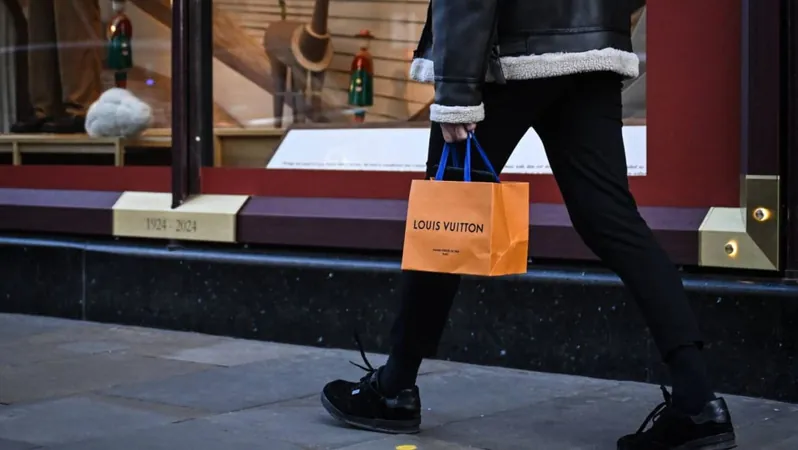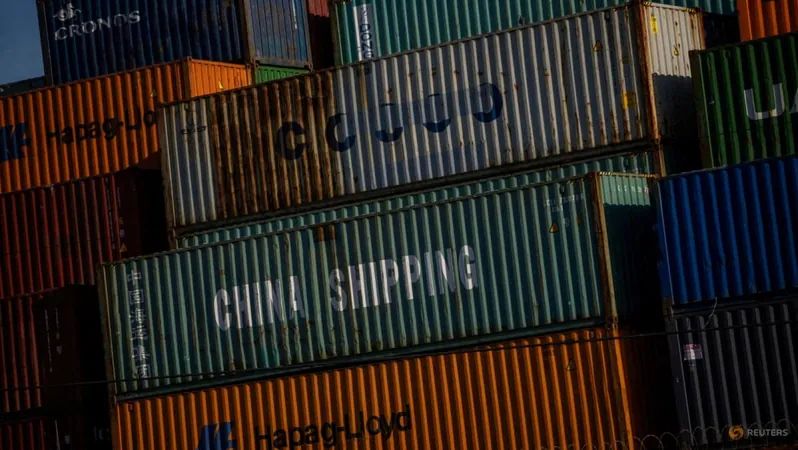
LVMH Sales Plunge: A Troubling Sign for the Luxury Market
2025-04-15
Author: Nur
A Shockwave in Luxury Sales
In a startling turn of events, LVMH, the global titan of luxury goods, has reported a significant sales drop in the first quarter of the year, raising alarm bells for the entire luxury sector. The company’s sales plummeted more than anticipated, revealing the harsh impact of US President Donald Trump’s sweeping tariffs.
Struggling Numbers in Fashion and Leather Goods
The luxury leader's fashion and leather goods division, home to iconic brands like Louis Vuitton and Christian Dior, saw organic sales nosedive by 5% compared to last year, totaling €10.1 billion (US$11.46 billion). This stark decline fell far short of the expected 1% growth, with Bernstein analyst Luca Solca describing it as a "soft start" to 2025.
A Ripple Effect from Tariffs and Trade Wars
As the first luxury giant to disclose its quarterly performance following Trump’s tariff announcements, LVMH is in uncharted waters. The burgeoning trade war between the US and China—the two largest luxury markets—poses a serious threat to the global economy and market stability, leading to rising concerns among economists.
Overall Sales and Market Reactions
Overall, LVMH experienced a 3% drop in group sales, totaling €20.3 billion, which fell well below forecasts expecting no change. The luxury powerhouse, valued at €244.2 billion, is not immune to the challenges affecting the industry, which thrived amid pandemic conditions.
Chinese Market Weighs Heavily
One of the most significant factors contributing to LVMH's struggles is waning demand from Chinese consumers, who are pivotal to the luxury market's success. Sales in Asia, excluding Japan, fell an alarming 11% year-on-year. Chief Financial Officer Cecile Cabanis confirmed that there was "no change in domestic demand in China," with McKinsey projecting a contraction of 18-20% in the Chinese luxury market for 2024.
Declines Across Several Divisions
LVMH's fortunes have also dipped in the US, where sales fell by 3%. The beauty sector, including the popular chain Sephora, reported disappointing results following a period of strong sales. Additionally, the wine and spirits division faced a 9% drop, further compounding the difficulties.
Mixed Results from Global Markets
While Japan experienced a 1% decline in sales, Europe showed some resilience with a 2% increase. However, the unexpected weight of the tariffs has led industry analysts to revise their forecasts for luxury consumer spending downward, raising concerns about overall market confidence.
Looking Ahead: Predictions and Concerns
Despite the ability of luxury buyers to absorb price increases more than other consumers, the market turmoil may dampen consumer confidence across income levels. HSBC now predicts flat earnings for the luxury sector in 2025, down from earlier growth expectations of 5%. Bernstein takes an even more pessimistic stance, predicting a 2% contraction this year instead of the previously anticipated rise.




 Brasil (PT)
Brasil (PT)
 Canada (EN)
Canada (EN)
 Chile (ES)
Chile (ES)
 Česko (CS)
Česko (CS)
 대한민국 (KO)
대한민국 (KO)
 España (ES)
España (ES)
 France (FR)
France (FR)
 Hong Kong (EN)
Hong Kong (EN)
 Italia (IT)
Italia (IT)
 日本 (JA)
日本 (JA)
 Magyarország (HU)
Magyarország (HU)
 Norge (NO)
Norge (NO)
 Polska (PL)
Polska (PL)
 Schweiz (DE)
Schweiz (DE)
 Singapore (EN)
Singapore (EN)
 Sverige (SV)
Sverige (SV)
 Suomi (FI)
Suomi (FI)
 Türkiye (TR)
Türkiye (TR)
 الإمارات العربية المتحدة (AR)
الإمارات العربية المتحدة (AR)